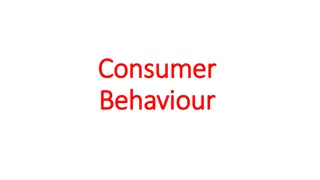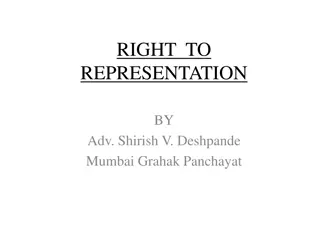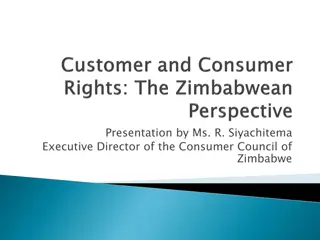Ethical Considerations in Neuromarketing: Balancing Consumer Protection
Neuromarketing explores the ethical implications within food retailing, considering the impact on consumer awareness and decision-making. The discussion delves into the use of neuromarketing techniques, ethical viewpoints, and the development of ethical codes to guide industry practices.
Download Presentation

Please find below an Image/Link to download the presentation.
The content on the website is provided AS IS for your information and personal use only. It may not be sold, licensed, or shared on other websites without obtaining consent from the author.If you encounter any issues during the download, it is possible that the publisher has removed the file from their server.
You are allowed to download the files provided on this website for personal or commercial use, subject to the condition that they are used lawfully. All files are the property of their respective owners.
The content on the website is provided AS IS for your information and personal use only. It may not be sold, licensed, or shared on other websites without obtaining consent from the author.
E N D
Presentation Transcript
Neuromarketing in Food Retailing Ethical issues of neuromarketing Chapter 3 M. PETZ AND R. HAAS
Some views about neuromarketing If neuromarketing techniques are used properly, we ll have better ads, better products, and happier customers. Who wouldn t want a product they liked more or a less boring commercial? Would consumers really be better off if companies annoyed them with ineffective but costly ad campaigns? Any marketing tool can be 'evil' if the company behind it misuses it. Advertising can be fun and informative; it can also contain false information or misrepresent the product Neuromarketing is simply another technique that marketers can use to understand their customers and serve them better Roger Dooley (Dooley, 2011). This context suggests that external constraints on decision making imposed by applications of neural manipulation are possible violations. Transgressions are particularly troublesome when manipulation occurs without explicit awareness, consent, and understanding (Wilson et al., 2008).
The broad scope of neuromarketing 1/2 Ethics in neuromarketing is partially dependent on where the system boundary is drawn The private and public spheres have different standards as to what is acceptable. The manufacturer or neuromarketer needs to know what they are conveying; and the audience needs to appreciate what they should get from a communication and not something else.
The broad scope of neuromarketing 2/2 Ethical viewpoints: Utilitarian viewpoint; what is for the greatest good in aggregate as a community Ethical egoism; individually focused You can not only follow your ethical viewpoint, but you should compare it with the international standard or others ethics Ethical Code of Neuromarketing
Ethical Code of Neuromarketing NMSBA (Neuromarketing Science and Business Association) created the NMSBA Code of Ethics for the Application of Neuroscience in Business. ESOMAR (European Society for Opinion and Market Research) created 36 Questions to Help Commission Neuroscience Research ICC (International Chambre of Commerce) created guidelines, codes and rules and put it together in Advertising and marketing communication practice Consolidated ICC Code. Together they provide a framework and advice on how to carry out neuromarketing research
Ethical issues affecting neuromarketing Consumer protection; There is a difference between identifying that need, and perhaps arranging a diner in a way that raises anxiety levels and then promotes 'solutions' to feeling anxious Free Speech; This can be reduced to the debate over free will, and how much free will we really have in the face of propaganda, the onslaught of advertising or peer pressure shaped by those forces. This question of autonomy which is the ability to make and do things of your own volition, and the rights for a corporate person, or anyone else to influence it when it is commercial speech is strongly debated Unfair commercial practices; How ethical would it be if optical illusions, like moving pictures technology, was applied to a product placement as part of the marketing mix so a consumer did not notice something was absent, which they normally relied upon for decision making?
Ethical issues affecting neuromarketing Validity to potential buyers of research / findings, accreditation; The pharmaceutical industry with its high expenditures, important life-saving purposes and well educated experimental designers has many examples of drug trials that fail due to poor experimental design. Torts and negligence; The use of neuromarketing techniques to induce purchase of a product which, if misused, could cause personal injury, raises important questions under the law of products liability (Voorhees et al., 2011). Injury and adverse reaction reporting; Just as there is no safe food and no safe medicine for everyone it must be questioned if any neuromarketing technique won t also find its share of affected peoples who suffer some level of injury. Allergies have been claimed for water (aquagenic urticarial) and electricity (electrical sensitivity) and it is likely that some will claim similar for neuromarketing techniques if they become widespread
Ethical issues affecting neuromarketing Consent can be given; Explicitly by writing and filling out paperwork. This is the ideal in a research context. Implicitly by making it obvious through signage and common norms that entering this website, store, mall or manufacturing environment gives consent. Here making sure that people know, understand and agree is harder. Privacy issues; claims by neuromarketers about the power of their techniques to understand brain function and impact behavior have predictably raised privacy concerns among regulators and the general public (Voorhees et al., 2011). Vulnerable groups; vulnerable consumers are those more exposed to a commercial practice or a product because of their mental or physical infirmity, age or credulity.
Ethical issues affecting neuromarketing Targeted groups; It is a common marketing technique to identify a target market of a profiled group of consumers rather than undifferentiated mass-marketing approach. But is it ethical to focus personal differences, ethnicity or income levels for example? Individuals versus groups; With neuromarketing there could be more forms of metadata that are useful, for example the times of day a research subject is not so aware and capable of rationally making a purchase decision. This is how metadata can be useful from one individual, but data can be collected in aggregate, which brings new moral questions. Stereotyping; The stereotyping and resultant action individuals suffer as being linked, perhaps falsely linked. Like logical fallacies, these are not per se neuromarketing ethical issues, but the praxis of consumer neuroscience may make them relevant.
Ethical issues affecting neuromarketing Tragedy of the commons; The tragedy of the commons, whereby all with an interest in gathering data take that data, yet none take responsibility for the transgressions that result. The Everyone s a winner; Neuromarketing states many times that everyone s a winner during their researches, but is that ethically right? Unexpected findings protocol; Some of the techniques that are being applied in consumer neuroscience reveal anomalies that indicate a pathology may be present or may be developing. Developing a protocol for such unexpected findings is the ethically correct response.
Ethical issues affecting neuromarketing Protecting research participants; Research participants need their data protecting from large corporations, the state and insurers who may use it. Data cleaning; The original data should always be kept in its original form, as computer manipulation and data transference can cause data loss and data corruption. The Responsible Scientiest with Media Strategy; ...neuromarketers have an obligation to maintain scientific transparency in media and marketing communications that goes beyond what is required of traditional market research providers, because their methods are so new and different and many of the underlying scientific principles are so counterintuitive (Genco et al., 2013).
Ethical issues affecting neuromarketing Sub-culture differences of perspective for managers and scientists; Confidentiality on pricing between B2B clients is prudent to maintain market share, but it is not an ethical decision to make it open or not. Dublin core; Data can be appropriately classified by using the Dublin Core Schema that labels information and artifacts, which are called objects in the Dublin Core (DC) terminology, in whatever form it has with meta-data tags. Personal information collected shall be collected for specified Neuromarketing research purposes and not used for any other purpose Different techniques used in neuromarketing like; Single-neuron recording (which involves putting electrodes on the human brain), fMRI machine (it can be seen as uncomfortable and very noisy) and QEEG (it can cause seizures or allergic reactions).
Summary We looked at: The broad scope of neuromarketing The Ethical Code of Neuromarketing Ethical issues affecting Neuromarketing























